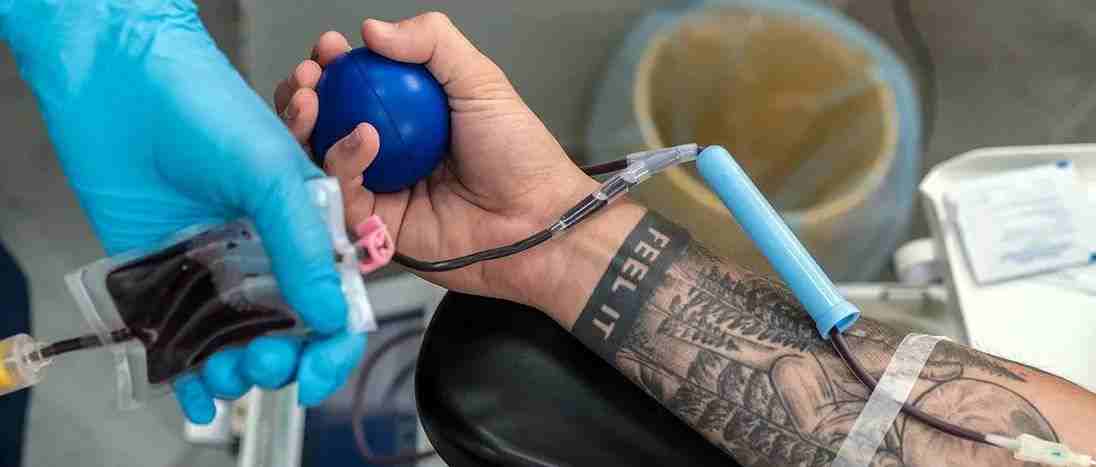科学家发现改变血型新方法:A型B型变万能O型 | 经济学人(泛读)

1
2
Science and technology | Transfusion
A promising technique could make blood types mutually compatible
That would ease the demand for type-O donors
Everyone hasa blood group, defined by the characteristic chains of sugar molecules, or antigens, that protrude from their red blood cells like spikes on a hedgehog’s back. Not all these groups are created equal. In the roughly 50% of people with type o, the sugars are harmless, allowing their blood to be transfused into any needy body. In those with a and b blood groups, however, the antigens can trigger harmful immune reactions in someone with a different group. Those with ab blood, who have both types of antigen, can only donate blood to one another.
Supplies ofo are therefore in very high demand. If other groups could be transformed to o, the supply of universal donors could be instantly doubled. Now researchers reckon they might have found a way to do it, thanks to a new mix of enzymes found inside gut bacteria.
Scientists have experimented with enzymes, biological molecules that facilitate biochemical reactions, to removea and b antigens to make o-type blood for decades. But enzyme-treated blood can still be incompatible. Writing in Nature Microbiology on April 29th, Martin Olsson, a transfusion-medicine consultant at Lund University in Sweden, and Maher Abou Hachem from Denmark’s Technical University argue that the problem could stem from lengthened antigen sugar chains, called extensions, that are not targeted by current enzymes. That led the team to hunt for enzymes capable of removing the antigens as well as their extensions. They settled on enzymes from Akkermansia muciniphila, a bacterium that feasts on the protective mucus lining the gut, because mucus contains sugars similar to those on red blood cells.
Their idea held up: using a mix of differentA. muciniphila enzymes, the team removed both the antigens and their known extensions. To test if that made any difference to compatibility, they ran tests that combined the treated red blood cells with plasma, the watery component of blood, from other blood groups. If antibodies in the plasma bind to antigens in the treated blood, the test yields a positive result, indicating incompatibility. A negative result suggests donation is safe. When type b blood cells were treated with the enzyme mix, the negative rate was between 91% to 96%. When the extension-targeting enzymes were left out, the rate was around 80%, implying that the new extensions were at least partly responsible for the difficulty in making universal blood. Though rates of 100% would be ideal, some margin of error may be acceptable if negative results only produce weak immune reactions—something clinical trials could establish.
But the job is not yet done. Whena blood group cells were treated with the enzymes, the negative rate was closer to 50%. This is better than the 17-20% they achieved without extension-targeting enzymes, but is “not really the universal concept”, says Dr Olsson. It is possible that some type-a extensions may be resistant to the current mix of enzymes; Dr Olsson reckons an improved recipe may prove more effective. But there are other limitations too: some people’s blood also contains Rh, a group of undesirable but less dangerous protein antigens whose presence turns a “negative” blood type such as ab- into a “positive”, such as ab+. As they contain no sugar molecules, they are unaffected by the enzymes. Removing Rh as well may need another approach entirely.
If these hurdles can be overcome, the benefits could be substantial. Several countries, including America and Britain, have faced serious blood shortages in recent years, and ageing populations are expected to increase the demand for blood yet further; in high-income countries more than half of transfusions go to people over 60. Being able to dispense with group-matching would allow blood banks to call on donors of all kinds when faced with an urgent shortage, not just those witho-group blood. Waiting lists for organ transplants could also shorten, as organ donors and recipients currently need to have compatible blood groups. Never would a sudden rush of blood lead to more justified excitement.
3
愿景
打造
01 经济学人打卡营
每周一到周五阅读经济学人
并在群里以及小鹅通内写分享
分享是文章的总结或者观点或者语音打卡
字数不少于100字,中英文都可以
群里每周免费分享最新外刊合集
最新评论
推荐文章
作者最新文章
你可能感兴趣的文章
Copyright Disclaimer: The copyright of contents (including texts, images, videos and audios) posted above belong to the User who shared or the third-party website which the User shared from. If you found your copyright have been infringed, please send a DMCA takedown notice to [email protected]. For more detail of the source, please click on the button "Read Original Post" below. For other communications, please send to [email protected].
版权声明:以上内容为用户推荐收藏至CareerEngine平台,其内容(含文字、图片、视频、音频等)及知识版权均属用户或用户转发自的第三方网站,如涉嫌侵权,请通知[email protected]进行信息删除。如需查看信息来源,请点击“查看原文”。如需洽谈其它事宜,请联系[email protected]。
版权声明:以上内容为用户推荐收藏至CareerEngine平台,其内容(含文字、图片、视频、音频等)及知识版权均属用户或用户转发自的第三方网站,如涉嫌侵权,请通知[email protected]进行信息删除。如需查看信息来源,请点击“查看原文”。如需洽谈其它事宜,请联系[email protected]。